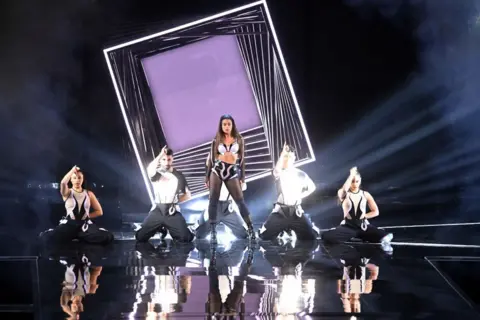Israel's Eurovision entry under scrutiny over alleged reference to Hamas
 Shai Franco
Shai FrancoIsrael says it will pull out of the Eurovision Song Contest if organisers try to censor its entry.
It comes after the lyrics to Eden Golan's October Rain were leaked to the media earlier this week.
According to the Israel Hayom newspaper, the song references the victims of the 7 October Hamas attacks, with lyrics including: "They were all good children, each one of them."
Eurovision organiser The EBU said it was currently assessing the song.
The contest's rules forbid political messages, in a gesture to neutrality.
In previous years, the EBU has forced national representatives to change their lyrics. In 2009, Georgia withdrew from the contest after their proposed entry - We Don't Wanna Put In - was rejected for its obvious references to the Russian president.
In a statement regarding Israel's 2024 entry, organisers said: "The EBU is currently in the process of scrutinizing the lyrics, a process which is confidential between the EBU and the broadcaster until a final decision has been taken.
"If a song is deemed unacceptable for any reason, broadcasters are then given the opportunity to submit a new song or new lyrics."
However, Israel's public broadcaster, KAN, said it would reject any request to alter the lyrics.
"It should be noted that as far as the Israeli Broadcasting Corporation is concerned there is no intention to replace the song."
"This means that if it is not approved by the European Broadcasting Union, Israel will not be able to participate in the competition, which will take place in Sweden next May."
'Scandalous' decision
KAN also confirmed that the leaked lyrics for October Rain were accurate, and published them in full on its website on Wednesday.
Described as a "moving and powerful ballad" the song is based around the refrain "I'm still wet from this October rain".
In the verse, Golan sings: "Who told you boys don't cry/ Hours and hours/ And flowers/ Life is not a game for the cowards."
The reference to flowers is significant, according to Israel Hayom, as it is military slang for war fatalities.
The song then ends in Hebrew: "There's no air left to breathe/ There's no place/ No me, from day to day."
KAN said that Israel's culture minister Miki Zohar had contacted the President of the EBU to request that the panel approve the song.
"In his letter, the minister wrote that Israel is in one of its most complex periods, and that this fact cannot be ignored when choosing a song to represent it," the broadcaster reported.
 Getty Images
Getty ImagesWriting on X, Mr Zohar said it would be "scandalous" to disqualify the song.
"The song of Israel, which will be performed by Eden Golan, is a moving song, which expresses the feelings of the people and the country these days, and is not political," he added.
"We all hope that Eurovision will remain a musical and cultural event and not a political arena - where the participating countries can bring their uniqueness and nationalism to the stage through music.
"I call on the European Broadcasting Union to continue to act professionally and neutrally, and not to let politics affect art."
Calls for disqualification
Separately, musicians from other countries that participate in Eurovision have called for Israel to be suspended over the war in Gaza.
In December, Iceland's Association of Composers and Lyricists published a statement saying Israel's military action made its participation incompatible with an event "characterised by joy and optimism".
Similar protests have been raised in Finland, Norway, Denmark and Sweden, with several pointing out that Russia has been disqualified since its invasion of Ukraine two years ago.
So far, Eurovision organisers have resisted calls for Israel's exclusion, saying the situations in Ukraine and Gaza are different.
"Comparisons between wars and conflicts are complex and difficult and, as a non-political media organization, not ours to make," Noel Curran, the director general of the European Broadcasting Union said in a statement.
"We understand the concerns and deeply held views around the current conflict in the Middle East," he said. However, he added, Eurovision was "not a contest between governments".
"The EBU is aligned with other international organizations, including sports unions and federations and other international bodies, that have similarly maintained their inclusive stance towards Israeli participants in major competitions at this time," the statement concluded.
